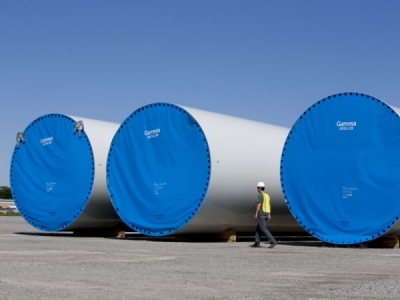
Posted on June 20, 2019
This should be time to party at the Massachusetts Clean Energy Center. After all, the agency’s underused marine terminal in New Bedford is finally profitable, and a big tenant is on its way.
But maybe MassCEC should keep the champagne on ice. The saga of the New Bedford Marine Commerce Terminal took an unfavorable turn against the state on Monday when a jury in Suffolk Superior Court ruled that contractors that built the port are owed at least $20 million for unpaid work.
Cashman Dredging, the Quincy business run by Jay Cashman, and its New Jersey partner, Weeks Marine, had sued MassCEC three years ago. The main beef: The amount of bedrock and boulders the joint venture needed to clear from the harbor and the 28-acre site was far in excess of what was initially advertised, driving up the cost and making it more challenging to get the job done on time. The state agency fired back, accusing the joint venture of making a faulty analysis of the site conditions.
At the time, it was another black mark for a project that seemed cursed. The Patrick administration spent $113 million, largely with state bond money, to build a staging area for offshore wind farms in the hopes that it would help spark a burgeoning industry. Cape Wind had signed a two-year lease agreement, with plans to stage construction for its Nantucket Sound wind farm there.
But around the time that the Cashman-Weeks venture finished the job in early 2015, the Cape Wind project lost the contracts it needed to finance what was to have been the country’s first offshore wind farm. The lease was scuttled later that year, and plans for Cape Wind were later dropped completely.
Suddenly, the New Bedford terminal’s break-even point was starting to look as evasive as a certain great white whale.
MassCEC found itself in the cargo shipping business, as it accommodated all manner of arrivals at the terminal to help pay the bills. Governor Charlie Baker inherited the project, and Baker’s point person on energy issues at the time, Matt Beaton, called it “a very big gamble.”
The terminal’s fortunes improved significantly in 2016 when the Legislature passed a clean-energy law requiring Massachusetts utilities to make major purchases of offshore wind power. Three bidders pursued those contracts, with a developer called Vineyard Wind winning the first bid for 800 megawatts of electricity, enough to power 460,000 homes. More contracts are on their way. Suddenly, this industrial stretch of the New Bedford waterfront became a hot commodity.
The terminal broke even for the first time in the 2018 fiscal year, on an operating basis: MassCEC reported $784,000 in revenue that year, compared with $734,000 in operating expenses. (The port currently hosts a variety of meteorological vessels and supports the state’s fisheries restoration efforts.) Most notably, Vineyard Wind committed to an 18-month lease for the entire site, valued at $9 million, far more than Cape Wind was going to pay. However, that lease doesn’t start until December 2020.
But the dispute with Cashman-Weeks continued to hang like a dark cloud. The trial lasted several weeks, although the jury didn’t take long to deliberate. They began on Friday afternoon, and finished up Monday morning, according to Harry Manion and Martin Gaynor, the lawyers who represented the contractor in the trial.
MassCEC wouldn’t say much when asked about the verdict. A spokesman said the agency is disappointed in the ruling and is reviewing its appeal options.
Like many construction projects, this one was marred by cost overruns. Manion and Gaynor say their client originally agreed to do the job for $60 million, but eventually received $80 million because of change orders. (The $113 million that the state spent includes costs outside of the joint venture’s scope of work.) Now, if the jury’s verdict stands, the price tag will rise by another $20 million-plus, pushing the day when the state recoups its New Bedford investment further out into the future.
Source: bostonglobe.com





